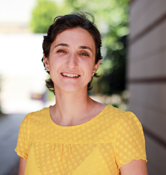|
INTERVIEWS
Podcast/Video Interviews by Stephen Ibaraki
A Chat with Prof. Clarice D. Aiello: Quantum Engineer; Leads Quantum Biology Tech(QuBiT) Lab at UCLA
This week, Stephen Ibaraki has an exclusive interview with Prof. Clarice D. Aiello.
 Prof. Clarice D. Aiello is a quantum engineer interested in how quantum physics informs biology at the nanoscale. She is an expert on nanosensors harnessing room-temperature quantum effects in noisy environments. Prof. Clarice D. Aiello is a quantum engineer interested in how quantum physics informs biology at the nanoscale. She is an expert on nanosensors harnessing room-temperature quantum effects in noisy environments.
Born and raised in sunny Brasil, Clarice received her B.S. in Physics from the Ecole Polytechnique; her M.Phil. in Physics from the University of Cambridge, Trinity College; and her Ph.D. from MIT in Electrical Engineering. She also held postdoctoral appointments in Bioengineering at Stanford, and in Chemistry at Berkeley. Two months before the pandemic, she joined UCLA, where she leads the Quantum Biology Tech (QuBiT) Lab.
Quantum effects in biology, particularly those driven by weak magnetic fields (with the strength of a cell phone's!), seem to be organism-agnostic and widespread (see this compilation). The QuBiT Lab develops endogenous (i.e., no need for genetically engineering cells), non-chemical, non-invasive, cheap, portable, remotely-actuated electromagnetic medical treatments to a series of ailments, incl. neurological and metabolic malfunctioning, and cancer. Such electromagnetic medical treatments can be deployed for: disease prevention; correction of disease course; defense against bioelectromagnetic threats; and biomanufacturing (e.g., increase in cell proliferation).
A recorded talk by Clarice, targeted at bioscientists, is found here; recent results from her lab are found in these slides.
Clarice is the de facto head of the Quantum Biology community-building efforts worldwide, being behind:
- the weekly Big Quantum Biology Meetings (attended internationally; mailing list reaching 600+);
- chair of the first-ever Quantum Biology GRC Conference (a Conference within a prestigious series);
- and main PI of a NSF "Research Coordination Network" grant (== a community-building grant) on Quantum Biology.
The American Physical Society recently published Clarice's opinion piece: "It's time to take Quantum Biology research seriously". This seems to be the first time that APS opens space for discussion about the field, which is an important step towards its recognition by physicists.
The Conversation also published Clarice's broad "vision piece": "Quantum physics proposes a new way to study biology – and the results could revolutionize our understanding of how life works".
A list of introductory academic papers on Quantum Biology, compiled by Clarice, is found here.
TO WATCH THE VIDEO INTERVIEW, CLICK ON THIS MP4 file link
|